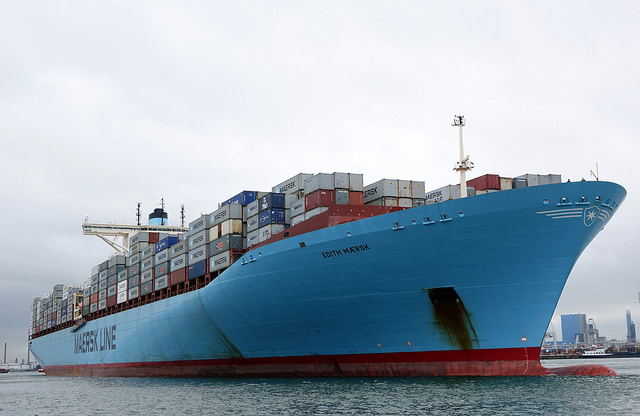The seizure on March 26, 2015, of the Marshall Islands-flagged Maersk Tigris cargo ship by Iranian forces off its coast at the Strait of Hormuz on a years-old dispute over containers is something that should get everyone’s attention. What is even more troubling than the seizure of a commercial vessel is that Maersk had agreed to settle the dispute. Iran is appealing for more money in the courts, but, rather than let the courts proceed, took the matter into its own hands.
Understand that one fifth of the world’s oil passes through the Strait of Hormuz in a given year.
We know that piracy, especially off the east coast of Africa and in the vast Asian Pacific, has become a major concern to shippers. So much so that Rolls Royce has announced that one of the benefits of its proposed crewless ship is that it would be much easier to take down pirates, because there will not be the crew hostages to deal with, as there are today. However, if nations begin to seize ships outside the law and with as flimsy an excuse as Iran has in the Maersk case, this is cause for alarm.
While the U.S. will be escorting U.S.-flagged vessels in the area of the seizure, our military fleet is simply inadequate to serve all potential hot spots. Even with escort protection, the risks of confrontation accelerate. Confrontation can include blockades, using vessels to buzz or interfere with navigation or otherwise harass shipping and their escorts, firing shots across the bow, ramming and even firing on vessels and their escorts. Recall that the U.S. entered World War I and World War II and increased our presence in Vietnam as the result of the Germans' sinking of the Lusitania, the Japanese bombing of Pearl Harbor and the very questionable U.S.-North Vietnamese Gulf of Tonkin incident—all military events involving the sea.
Not all military maneuvers on the seas are necessarily problematic. The U.S. Coast Guard has become adept in hunting down drug traffickers and human smugglers in U.S. waters and cooperates with Central and South American countries to interdict traffickers in the greater Gulf of Mexico. However, these small ships, submarines and speedboats are not like the huge container vessels that large shipping conglomerates operate worldwide.
Even so, there are times when even larger ships pose challenges to countries and militaries, generally for contraband, drugs or illegal shipments of weapons. In 2013, Panamanian officials detained the North Korean-flagged Chong Chon Gang en route from Cuba to North Korea on suspicion of drug trafficking. The investigation uncovered cargo that looked like weapon systems subject to international sanctions against delivery to North Korea. The Panamanian Government consulted with the UN, and the dispute was resolved. In this incident, international law was followed. In the Iranian incident, it is much less clear that its military had the authority to seize the Maersk ship over a payment dispute already in the court system under appeal.
The Shipping Juggernaut
The World Shipping Council reported that world container shipping alone in 2009 produced an annual economic contribution of:
- Direct gross output or GDP Contribution -- $ 183.3 Billion
- Direct capital expenditure -- $ 29.4 Billion
- Direct jobs -- 4.2 million
- Compensation to those employees $ 27.2 Billion
The global supply matrix relies heavily on container and bulk shipping to move raw materials, parts and components and complete product between producers, suppliers and customers to virtually every large-vessel navigable port in the world. Some of the biggest container vessels can carry 11,000 containers, and the loss of even one could strain world marine insurance resources. The increase in traffic and size of vessels has led to major efforts to widen the Panama and Suez canals. The Port of Long Beach 20-mile Alameda Corridor went online in 2002 to speed rail traffic under the streets of Los Angeles to remove a major bottleneck to the U.S.’s busiest container port. We can only speculate that one reason why Warren Buffett purchased the Burlington Northern Santa Fe (BNSF) railroad in 2009 was because he saw the spectacular increase in container rail traffic from ports on all U.S. coasts to all parts of the interior.
The modern insurance industry has its roots and owes even much of its policy language to marine insurance beginning with Lloyds during the first tranche of globalization when Britain and other European powers needed to cover commercial trade to and from their vast worldwide colonies. The ocean is big business.
Law of the Seas Doctrine
Who owns the sea? We all do. However, after World War II, many countries led by the U.S. increased the size of their territorial waters for security, fishing and other purposes. In 1967, the UN decided it was time to convene a group to develop an international law of the sea. Unlike trade agreements, the international law of the sea is a framework not for tariffs, taxes and other international economic activities, but for how we may use the sea as our collective heritage. We might compare the international law of the sea to the rules promulgated by the National Parks Service for what people can and cannot do while visiting, working in or otherwise using the natural resources of Yellowstone Park.
The convention can be summarized as follows: The seas are open and free to all states, coastal or landlocked. Passage shall be free and unhindered. The sea is the heritage of all humanity, which includes conservation and protection of these resources from pollution or overfishing or other adverse activities. The seas shall be used for peaceful purposes. Ships and states have a duty to render assistance to vessels and persons in trouble. Cooperation is expected to repress piracy.
These are some of the key provisions relevant to the discussion of the Iranian seizure:
- 12-nautical-mile limit on territorial waters.
- “Ships and aircraft of all countries are allowed 'transit passage' through straits used for international navigation; States bordering the straits can regulate navigational and other aspects of passage”
- “All other states have freedom of navigation and overflight in the EEZ [Exclusive Economic Zone], as well as freedom to lay submarine cables and pipelines”
- “Land-locked and geographically disadvantaged states have the right to participate on an equitable basis in exploitation of an appropriate part of the surplus of the living resources of the EEZ's of coastal states of the same region or sub-region; highly migratory species of fish and marine mammals are accorded special protection”
- “All states enjoy the traditional freedoms of navigation, overflight, scientific research and fishing on the high seas; they are obliged to adopt, or cooperate with other states in adopting measures to manage and conserve living resources”
- “Land-locked states have the right of access to and from the sea and enjoy freedom of transit through the territory of transit states”
- “State parties are obliged to settle by peaceful means their disputes concerning the interpretation or application of the convention”
- “Disputes can be submitted to the International Tribunal for the Law of the Sea established under the convention, to the International Court of Justice, or to arbitration. Conciliation is also available, and, in certain circumstances, submission to it would be compulsory. The tribunal has exclusive jurisdiction over deep seabed mining disputes.” (United-Nations 2012)
Iran is a 1982 signatory of the International Law of the Sea and included this statement:
In accordance with article 310 of the Convention on the Law of the Sea, the Government of the Islamic Republic of Iran seizes the opportunity at this solemn moment of signing the Convention, to place on the records its "understanding" in relation to certain provisions of the Convention…that only states parties to the Law of the Sea Convention shall be entitled to benefit from the contractual rights created therein. [including] The right of Transit passage through straits used for international navigation…The notion of "Exclusive Economic Zone" (Part V). - All matters regarding the International Seabed Area and the Concept of "Common Heritage of mankind" (Part XI)…In the light of customary international law, the provisions of article 21, read in association with article 19 (on the Meaning of Innocent Passage) and article 25 (on the Rights of Protection of the Coastal States), recognize (though implicitly) the rights of the Coastal States to take measures to safeguard their security interests including the adoption of laws and regulations regarding, inter alia the requirements of prior authorization for warships willing to exercise the right of innocent passage through the territorial sea…The right referred to in article 125 regarding access to and from the sea and freedom of transit of Land-locked States is one which is derived from mutual agreement of States concerned based on the principle of reciprocity.
However, Iran included this provision which may have led to its thinking it could lawfully detain the Maersk vessel.
Furthermore, with regard to "Compulsory Procedures Entailing Binding Decisions" the Government of the Islamic Republic of Iran, while fully endorsing the Concept of settlement of all international disputes by peaceful means, and recognizing the necessity and desirability of settling, in an atmosphere of mutual understanding and cooperation, issues relating to the interpretation and application of the Convention on the Law of the Sea, at this time will not pronounce on the choice of procedures pursuant to articles 287 and 298 and reserves its positions to be declared in due time."
We can expect that there will be incidents that involve questionable cargo subject to international restrictions and conventions, such as drugs, piracy, and prohibited weapons. We can expect that some of these interdictions will involve questions of fact that will be disputed or will later be found to be the result of false or misleading information or observation. However, disputes over cargo payments or other commercial activities whether between commercial ventures or states and commercial ventures deserve to be heard in arbitration procedures, courts of law or other internationally sanctioned dispute resolution venues.
Global trade has become too important for individual states to begin regulating the high seas on their own. There are many places of narrow passage like the Strait of Hormuz that border on many countries. We need to be especially vigilant in these areas and all agree to this specific International Law of the Sea provision: “Ships and aircraft of all countries are allowed ‘transit passage’ through straits used for international navigation; States bordering the straits can regulate navigational and other aspects of passage.”
We need also to prevent harassment or other restrictive activities so that border states in these narrow straits only introduce navigation and rights of passage regulations that are consistent with legitimate safety and security concerns. Slowages, frequent boardings, detentions and other activities that unnecessarily and intentionally restrain trade should be vigorously protested and prosecuted by international bodies and global industry.







